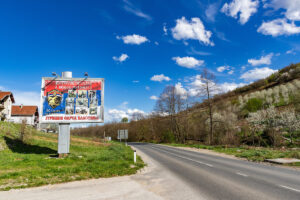The Srebrenica genocide, occurring from July 6 until July 11, 1995, during the Bosnian War, marked one of the darkest chapters in recent European history. Bosnian Serb forces, under the command of Ratko Mladić, overran the UN-declared “safe area” of Srebrenica, where thousands of Bosniak (Bosnian Muslim) men and boys had sought refuge. Despite assurances of protection from the international community, Bosnian Serb forces systematically separated and executed around 8,000 Bosniak men and boys in a matter of days. The massacre was characterized by its scale, brutality, and the failure of the international community to prevent it.

The Dayton Peace Agreement, signed in December 1995, brought an end to the devastating Bosnian War, which had torn apart the former Yugoslavia. Facilitated by international mediators, including the United States, the agreement established a framework for peace in Bosnia and Herzegovina. It delineated the country into two entities: the Federation of Bosnia and Herzegovina, primarily inhabited by Bosniaks and Croats, and the Republika Srpska (RS), predominantly populated by Serbs. The agreement also created a complex political structure with shared institutions to govern the country. While the Dayton Agreement succeeded in halting the bloodshed and establishing a fragile peace, it also perpetuated ethnic divisions and left underlying tensions unresolved, contributing to a challenging path toward reconciliation and stability in Bosnia and Herzegovina.
The International Criminal Tribunal for the Former Yugoslavia (ICTY) and the International Court of Justice (ICJ) eventually concluded that the massacre constituted an act of genocide—a classification that Republika Srpska (RS) and Serbia continue to dispute to this day. What is a genocide?
Article 2 of the Convention on the Prevention and Punishment of the Crime of Genocide defines genocide as the intentional commission of certain acts with the aim of destroying, either wholly or partially, a national, ethnic, racial, or religious group. These acts include:
- Killing members of the group;
- Causing serious bodily or mental harm to members of the group;
- Deliberately inflicting conditions of life calculated to bring about the group’s physical destruction, in whole or in part;
- Imposing measures intended to prevent births within the group;
- Forcibly transferring the children of the group to another group.
Srebrenica meets all of these criteria. It was evident that the intention was to destroy the local Bosniak population. Bosnian Serb forces carried out these killings systematically, separating men and boys from women and children before executing them en masse. Additionally, there were numerous instances of sexual violence, forced displacement, and the deliberate destruction of cultural and religious sites. In May 1992, Radovan Karadzic openly threatened the Bosnian parliament: “Do not think that you will lead Bosnia and Herzegovina to hell and consequently drive the Muslims to annihilation, because you Muslims cannot defend yourselves if a civil war breaks out in this country.” Nine days after the genocide took place, on July 20, 1995, the current President of Serbia, Aleksandar Vucic, declared: “Come and bomb us, kill one Serb, and we will kill 100 Muslims (Bosniaks).” These statements may have faded into the annals of history, but their echoes persist in the realm of Serbian politics, where proponents of such rhetoric still hold sway.
Recent Developments and the UN Resolution
On April 30, 2024, the UN Security Council held a meeting and provided an update on recent developments in Bosnia and Herzegovina. Miroslav Jenča, the UN Assistant Secretary-General for Europe, Central Asia, and the Americas, highlighted both positive and concerning trends in the region. He noted the consensus among Bosnia and Herzegovina’s political leadership on European integration as a path to stability and prosperity, alongside recent efforts supported by the UN Peace-building Fund to strengthen social cohesion and reconciliation. However, Jenca also expressed concerns about the rise of hate speech, genocide denial, and the glorification of war criminals, which threaten peace and reconciliation efforts. He emphasized the importance of addressing the legacy of past atrocities, including the Srebrenica genocide, for sustainable peace. The meeting also featured briefings from Zeljka Cvijanovic, representing Bosnia and Herzegovina, and Christian Schmidt, the UN High Representative for the country.
A staunch contributor to this ongoing societal division and tension is Milorad Dodik, president of the RS, a Putin proxy who has the backing of Vucic. Dodik has met with Putin several times since the start of the war in Ukraine, once in 2022 and twice in 2023. Once, he awarded Putin the highest RS medal of honour, and in June 2023, Putin bestowed upon him the Order of Alexander Nevsky. Dodik constantly threatens to secede the RS from Bosnia and Herzegovina.
In July 2021, former High Representative for Bosnia and Herzegovina Valentin Inzko introduced amendments to the country’s criminal code, instituting prison terms of up to five years for individuals who publicly condone, deny, or trivialise genocide, crimes against humanity, or war crimes. This move was met with condemnation from Bosnian Serb politicians. In response, on July 30, 2021, the National Assembly of RS (NARS) passed its own amendments to criminal law, imposing prison sentences of up to five years for those who criticise or label RS or its people as genocidal or aggressors, and up to 15 years for violations against its constitution, integrity, and independence. This marked the first instance of the NARS adopting a law directly challenging the authority of the High Representative.

The unit remembered by this banner was involved in atrocities during the war, including the operation of the Susica detention camp, where over 8,000 individuals were interned and at least 1,617 were killed between May and September 1992. Convictions have been made for various war crimes, including those related to this unit, where individuals were found guilty of murder, illegal detention, and other inhumane acts. (Photograph by Vudi Xhymshiti, for THE FRONTLINER, via VX Pictures)
All of these circumstances raised the urgency for the adoption of a resolution in support of Bosnia and Herzegovina. The United Nations General Assembly is set to vote in the coming weeks on designating July 11 as the “International Day of Reflection and Commemoration of the 1995 Genocide in Srebrenica.” Proposed by Germany and Rwanda, countries deeply affected by genocide, the resolution also condemns any denial of the Srebrenica Genocide. It enjoys support from the United States, France, the Netherlands, Italy, Jordan, and New Zealand, as well as regional allies like Albania, North Macedonia, and Turkey, among many other UN member states. The scheduled meeting on May 2 was rescheduled for a date after May 6.
Dodik and Vucic were indignant about these developments; Dodik delivered another threat of RS secession, publicly denied the genocide, and RS lawmakers compiled a report detailing the denial. This time, Dodik and Vucic will not be able to rely on Russia as they did in 2015, when Russia vetoed a similar resolution that was proposed in the Security Council. The key difference lies in the decision-making process between the Security Council and the General Assembly. While Security Council resolutions can be vetoed, General Assembly resolutions are not subject to veto power. Currently, efforts are underway to pass the resolution through the General Assembly, despite objections from Dodik and Vucic, who argue that matters concerning Bosnia and Herzegovina should be discussed exclusively within the Security Council.
If the resolution successfully passes, it will send a powerful message during these turbulent times, particularly directed at modern autocratic leaders such as Putin, Dodik, and Vučić. Though not formally termed as such, they are the trinity representing the ideals of the “Russian World.” Beyond offering solace to the souls of the fallen and bringing a measure of peace to the survivors, its significance extends to the broader global consciousness. The act of commemoration encapsulated within the resolution serves as a beacon, illuminating the important role of remembrance in our collective history. Through remembrance, we not only honor the past but also fortify our determination to prevent such atrocities from recurring. In today’s landscape, characterized by the imperative of unity within the Western world, the passage of the Srebrenica resolution represents a symbolic step toward embodying this collective unity and reaffirming the values of justice, accountability, and human dignity.
The West failed with the Dayton Agreement, leaving room for constant tension and ethnic division. Consideration of alternatives, such as federalisation or centralisation without entities, might have offered a solution. However, a combination of unfavourable circumstances at the time and a certain naivety among Western powers contributed to the current situation. The Serbian ‘elites’ in Bosnia and Herzegovina consistently indoctrinate local Serbians with animosity and hate, which results in historical revisionism and further segregation. The Serbians have never come to terms with their grim past or acknowledged its existence. One can only hope that Western powers now recognise the realities at hand and are prepared to rectify the ‘technical’ errors of the past. This resolution will shed light on numerous matters.
The persistent toleration by entities of the European Union and the US Government of the volatile situation in Bosnia and Herzegovina stands as a stark reminder of the failures inherent within international diplomacy. Their intermittent engagement and sometimes superficial interventions have only served to embolden figures like Dodik and Vucic, while leaving the deeply rooted issues of the region largely unaddressed. This lack of decisive action and meaningful involvement has not only allowed but also facilitated a climate where historical revisionism and ethnic divisiveness thrive unchecked. As the UN prepares to pass a significant resolution, it is imperative that these powers reflect on their roles and responsibilities. They must commit to a more active, consistent, and principled stance to ensure that the horrors of the past are not only remembered but also serve as a lesson to guard against future atrocities. This resolution, though symbolic, must ignite a renewed and sustained commitment from the West to address and resolve the underlying issues that continue to threaten the fragile peace in Bosnia and Herzegovina. The time for half-measures and diplomatic placation has passed; the moment calls for bold, transformative action that truly upholds the ideals of justice and human dignity.

Rron Dragidella
Rron Dragidella, a senior researcher from Kosovo and final-year International Relations student at Corvinus University of Budapest, contributes as a writer for the Frontliner. Specializing in European Integration, he brings a deep understanding to his analyses of global geopolitical and security dynamics.
With a keen interest in history complementing his grasp of current affairs, Rron offers a distinctive perspective on international issues. His insightful contributions promise to blend historical context with contemporary developments, providing Frontliner readers with a comprehensive and enlightening view of the forces shaping our world.

